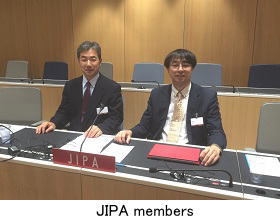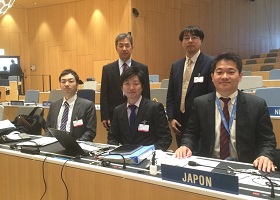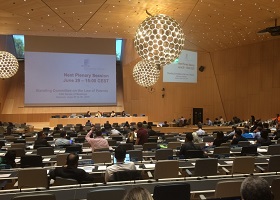International Activities
Participation in WIPO-SCP, the 24th session in Switzerland
 On June 27 to 30, 2016, the 24th session of the WIPO Standing Committee
on the Law of Patents was held in Geneva, Switzerland. JIPA sent to the
meeting two members, Mr. Masashi Shimbo, Chairperson, and Mr. Kenichi Morita,
Deputy Chairperson, of the Medicinal and Biotechnology Committee.
On June 27 to 30, 2016, the 24th session of the WIPO Standing Committee
on the Law of Patents was held in Geneva, Switzerland. JIPA sent to the
meeting two members, Mr. Masashi Shimbo, Chairperson, and Mr. Kenichi Morita,
Deputy Chairperson, of the Medicinal and Biotechnology Committee.
WIPO-SCP, which was founded in 1998, is a committee for developed and developing countries to gather and discuss issues related to international development of t he patent law, push forward cooperation therein, and develop guidelines therefor. Last year, the number of the meetings to be held was changed from once a year to twice a year. Some representatives from government agencies and representatives from NGO, etc. as observers from around the world participate in the meeting and hold discussions. JIPA is a formal observer who has a voice in the session.
WIPO-SCP has since last year been discussing the 5 major agenda of "Exceptions and limitations to patent rights," "Quality of patents, including opposition systems," "Patents and health," "Confidentiality of communications between clients and their patent advisors," and "Transfer of technology," and the necessity of a revision of the WIPO Model Law enacted in 1979. As harsh opinions were also expected in this year's meeting from developing countries about patent systems relating to pharmaceutical products, JIPA again sent a delegation from the Medicinal and Biotechnology Committee to address that issue. In particular, in order to enable timely expression of our opinion on the importance of patent systems in drug discovery and approaches to Access to Medicine in the pharmaceutical industry, we prepared a draft statement by working with the Japan Pharmaceutical Manufacturers Association (JPMA) and IFPMA. Furthermore, the delegation also consulted JPO before participating in the meeting.
Before this meeting, JIPA, an NGO in a developed country, made previous arrangements in cooperation with JPO and JPMA, and in the meeting JIPA achieved significant results as it successfully delivered the statement although there were many opinions from developing countries. However, we felt that it was still necessary to introduce the efforts of the Japanese pharmaceutical industry honestly tackling challenges in the development of new drugs and Access to Medicine in developing countries, and to seek appropriate patent protection of pharmaceutical products.
 Members from Japan
Members from Japan Conference Room
Conference Room
